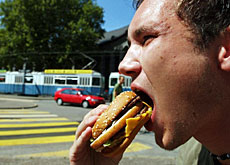
Salaries go furthest in Swiss cities

Residents of Swiss cities have the world’s highest purchasing power, despite having to pay more for goods than in most other European countries.
The latest update to the Prices and Earnings survey by Swiss bank UBS found that Zurich, Basel, Geneva and Lugano were among the most expensive cities in the world.
Zurich and the other Swiss cities listed in the survey, Basel, Geneva and Lugano, came near the top in every category of the survey, which is published by UBS economists every three years.
It compares the prices of goods and services, wages, wage deductions and working hours, along with the resulting purchasing power in 71 cities around the globe.
This year’s update – ahead of the next full survey in 2006 – is based on the statistics from the 2003 analysis, recalculated to take into account changes in exchange rate, inflation and economic productivity.
In terms of cost of living, Oslo remains the most expensive city in the world. Zurich ranks fourth, Basel seventh, Geneva ninth and Lugano tenth.
Gross earnings are the highest in Copenhagen and Oslo, with Copenhagen replacing Zurich as the city with the highest wages.
Zurich slipped in this regard due to the weaker Swiss franc compared with the Danish currency, slightly higher inflation and a faster growing economy in Denmark.
Purchasing power
However, Zurich tops the list as far as purchasing power is concerned with Luxembourg the only non-Swiss city in the top five.
The domestic purchasing power of residents of the leading cities is 50 to 60 per cent above the global average, with the lowest in Nairobi, Lagos, Karachi and Mumbai.
But UBS points out that comparisons are difficult to make since local workers in Asian or African cities will often choose to buy very different goods than in Europe or North America.
The bank said imports, which often cost as much in poor countries as they do in the west, tend to have a major impact.
In order to compare purchasing power, UBS also rated workers in the 71 cities on the length of time they had to work in order to buy a Big Mac hamburger.
People in cities in the United States topped the Big Mac index. A person in Chicago only has to work nine minutes before he or she has enough money for the hamburger, while someone in Miami or Los Angeles needs one minute longer.
Workers in Zurich in Basel have to stay at their desks a full quarter of an hour before they can satisfy their hunger.
swissinfo
The Prices and Earnings survey by UBS compares the prices of goods and services, wages, wage deductions and working hours, along with the resulting purchasing power.
More than 35,000 data items are collected and analysed.
The results are updated annually, as exchange rates and differences in inflation have a crucial impact on the comparison.
Domestic purchasing power (Zurich = 100):
Zurich: 100
Basel: 98.3
Luxembourg: 97.6
Geneva: 92.5
Lugano: 90.7

In compliance with the JTI standards
More: SWI swissinfo.ch certified by the Journalism Trust Initiative




























You can find an overview of ongoing debates with our journalists here . Please join us!
If you want to start a conversation about a topic raised in this article or want to report factual errors, email us at english@swissinfo.ch.